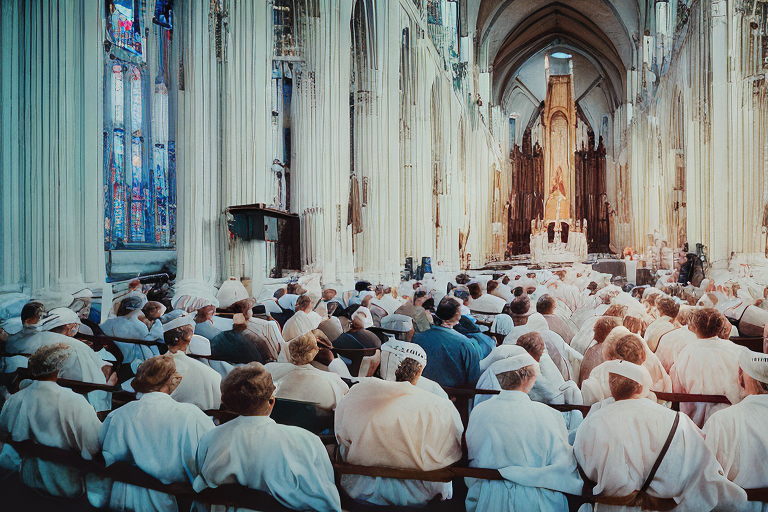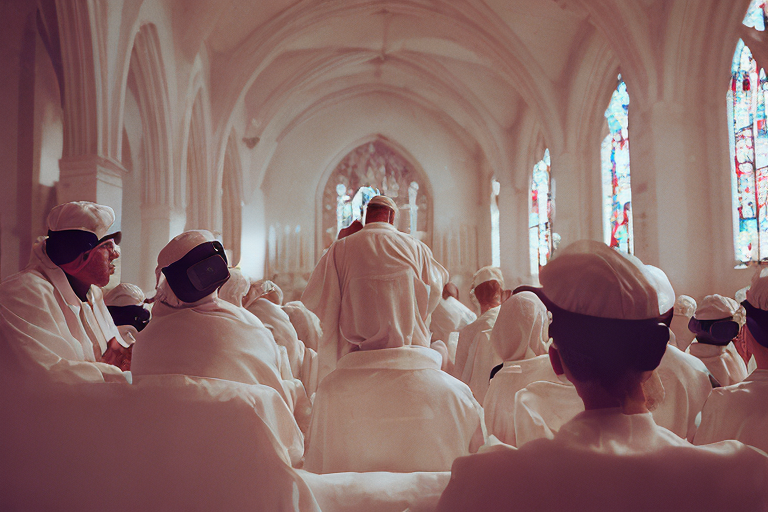믿음 기반 커뮤니티의 가상 현실(VR): 예배와 종교 교육의 강화(Virtual Reality in the Faith-Base…
본문

기술의 발전은 다양한 산업이 새로운 도구를 적용하고 통합하여 운영과 서비스를 개선할 수 있는 기반을 마련했습니다. 가상 현실의 혜택을 본 그러한 산업 중 하나는 믿음에 기반한 공동체입니다. 가상현실 기술은 신자들이 몰입형 환경을 통해 종교적 경험과 교육을 심화할 수 있는 기회를 제공합니다.
예배는 종교적 삶의 중심적인 측면이며, 가상 현실은 그것이 행해지는 방식을 변화시킬 수 있는 잠재력을 가지고 있습니다. VR을 통해, 신앙 공동체는 예배자들에게 더 매력적이고 상호 작용적인 경험을 제공하는 몰입형 환경을 만들 수 있습니다. 예를 들어, 한국에서, 한 교회는 성도들이 성경적인 장소를 탐험하고 그들의 신앙에 대한 더 깊은 이해를 얻을 수 있도록 하기 위해 가상의 성지 투어를 만들기 위해 VR 기술을 사용했습니다.
예배 외에도, 가상 현실은 종교 교육을 강화하는 데에도 사용되고 있습니다. VR은 전통적인 방법으로는 따라올 수 없는 방식으로 성경 이야기와 종교적인 가르침을 삶에 가져다주면서 더 매력적이고 상호작용적인 학습 경험을 제공할 수 있습니다. 예를 들어, 한국에서, 한 가톨릭 신학교는 학생들에게 그들의 믿음과 풍부한 역사에 대한 더 깊은 감사를 제공하면서 역사적인 교회와 유적지의 가상 여행에 VR 기술을 채택했습니다.

VR이 영향을 미치고 있는 믿음 기반 커뮤니티의 또 다른 측면은 자선 및 커뮤니티 지원입니다. VR을 통해 종교 단체는 그들의 임무와 영향을 강조하는 가상 경험을 제공함으로써 기금을 모으고 그들의 원인에 대한 인식을 만들 수 있습니다. 예를 들어, 한국의 한 교회는 가상현실을 사용하여 노숙자 보호소의 가상 시뮬레이션을 만들어 회원들이 노숙자들이 직면한 도전을 경험하고 그 원인을 위한 기금을 모을 수 있게 했습니다.
결론적으로, 가상 현실 기술을 신앙 기반 공동체에 통합하는 것은 사람들이 예배하고, 배우고, 그들의 종교 공동체와 연결되는 방식에 혁명을 일으킬 수 있는 잠재력을 가지고 있습니다. 몰입형 예배 경험에서 대화형 종교 교육에 이르기까지, VR 기술은 많은 사람들의 삶에 깊은 영향을 미치고 있습니다. VR 기술이 계속 발전함에 따라, 우리는 종교적 경험을 더욱 향상시킬 더 혁신적인 애플리케이션을 볼 수 있을 것으로 기대할 수 있습니다.
가상 현실 기술은 신앙 기반 커뮤니티에서 중요한 역할을 하기 시작했습니다. 그것은 예배와 종교 교육을 강화하기 위해 사용되고 있으며, 공동체 구성원들이 서로 그리고 그들의 믿음과 연결될 수 있는 새로운 기회를 만들고 있습니다.

가상 현실은 개인을 바티칸이나 알 아크사 모스크와 같은 다른 종교적 장소로 이동시키는 몰입형 경험을 만드는 데 사용될 수 있습니다. 이것은 여행을 할 수 없거나 종교적인 랜드마크에서 멀리 떨어진 곳에 사는 사람들에게 특히 도움이 될 수 있습니다. 그것은 또한 개인들이 다른 종교적 전통을 경험하고 다른 문화와 믿음에 대한 더 깊은 이해를 얻을 수 있는 기회를 제공합니다.
몰입감 있는 경험을 만드는 것 외에도, 가상 현실은 종교 교육에도 사용될 수 있습니다. 의료적 긴급 상황이나 자연 재해와 같은 실제 상황을 시뮬레이션함으로써, 개인들은 그들의 종교적 신념에 맞는 방식으로 이러한 상황에 대응하는 방법을 배울 수 있습니다. 이러한 유형의 훈련은 청소년과 청소년들이 안전하고 통제된 환경에서 믿음과 가치를 개발할 수 있도록 해주기 때문에 특히 가치가 있을 수 있습니다.
한국에서, 믿음에 기반을 둔 공동체에서 가상 현실의 사용이 주목을 받기 시작했습니다. 한 가지 예로 가상 현실 기술을 사용하여 개인이 우울증과 불안을 극복하도록 돕는 "Hope in VR" 프로젝트가 있습니다. 이 프로젝트는 개인들이 자연, 예술, 그리고 그들의 영적인 믿음과 연결되도록 돕는 가상 현실 경험을 제공합니다. 목표는 개인에게 희망과 치유의 감각을 제공하여 도전을 극복하고 만족스러운 삶을 살 수 있도록 하는 것입니다.
결론적으로, 가상현실은 개인들이 그들의 믿음과 서로 연결될 수 있는 새로운 기회를 제공하면서 믿음에 기반한 공동체에서 주요한 역할을 하기 시작하고 있습니다. 그것은 종교 교육과 예배에 혁명을 일으켜 개인들이 그들의 신앙을 경험하고 이해할 수 있는 새롭고 흥미로운 방법을 만들어 낼 수 있는 잠재력을 가지고 있습니다. 한국의 "Hope in VR" 프로젝트는 가상 현실이 영적인 행복을 증진시키고 개인에게 희망과 치유의 감각을 제공하기 위해 어떻게 사용될 수 있는지를 보여주는 하나의 예시일 뿐입니다.
The advancement of technology has paved the way for various industries to adapt and integrate new tools to enhance their operations and services. One such industry that has seen the benefits of virtual reality is the faith-based community. Virtual reality technology provides an opportunity for the faithful to deepen their religious experience and education through immersive environments.
Worship is a central aspect of religious life, and virtual reality has the potential to transform the way it is conducted. With VR, faith communities can create immersive environments that provide a more engaging and interactive experience for worshipers. For example, in Korea, a church used VR technology to create a virtual tour of the Holy Land, allowing its members to explore biblical sites and gain a deeper understanding of their faith.
In addition to worship, virtual reality is also being used to enhance religious education. VR can provide a more engaging and interactive learning experience, bringing biblical stories and religious teachings to life in a way that traditional methods cannot match. For example, in Korea, a Catholic seminary has adopted VR technology to bring its students on virtual tours of historic churches and sites, providing them with a deeper appreciation for their faith and its rich history.
Another aspect of the faith-based community that VR is making an impact on is charity and community outreach. With VR, religious organizations can raise funds and create awareness for their causes by providing a virtual experience that highlights their mission and impact. For instance, a church in Korea used VR to create a virtual simulation of a homeless shelter, allowing its members to experience the challenges faced by those who are homeless and raise funds for the cause.
In conclusion, the integration of virtual reality technology into the faith-based community has the potential to revolutionize the way people worship, learn, and connect with their religious communities. From immersive worship experiences to interactive religious education, VR technology is making a profound impact in the lives of many. As VR technology continues to advance, we can expect to see even more innovative applications that will further enhance the religious experience.
Virtual reality technology is starting to play a significant role in the faith-based community. It is being used to enhance worship and religious education, creating new opportunities for community members to connect with each other and their faith.
Virtual reality can be used to create immersive experiences that transport individuals to different religious sites, such as the Vatican or the Al-Aqsa Mosque. This can be especially beneficial for those who are unable to travel or who live far from religious landmarks. It also provides an opportunity for individuals to experience different religious traditions and gain a deeper understanding of other cultures and beliefs.
In addition to creating immersive experiences, virtual reality can also be used for religious education. By simulating real-life situations, such as medical emergencies or natural disasters, individuals can learn how to respond to these situations in a way that aligns with their religious beliefs. This type of training can be especially valuable for youth and young adults, as it allows them to develop their faith and values in a safe, controlled environment.
In Korea, the use of virtual reality in the faith-based community is starting to gain traction. One example is the "Hope in VR" project, which uses virtual reality technology to help individuals overcome depression and anxiety. The project offers virtual reality experiences that help individuals connect with nature, art, and their spiritual beliefs. The goal is to provide individuals with a sense of hope and healing, allowing them to overcome their challenges and live fulfilling lives.
In conclusion, virtual reality is starting to play a major role in the faith-based community, providing new opportunities for individuals to connect with their faith and each other. It has the potential to revolutionize religious education and worship, creating new and exciting ways for individuals to experience and understand their faith. The "Hope in VR" project in Korea is just one example of how virtual reality can be used to enhance spiritual well-being and provide individuals with a sense of hope and healing.














댓글목록 0